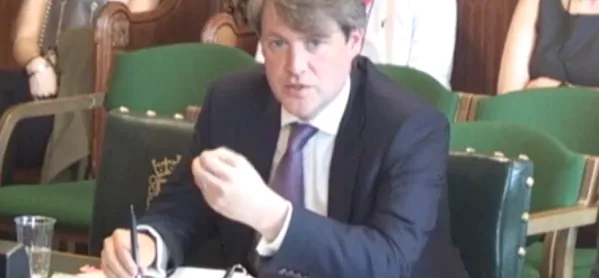A Department for Education minister has said he is going to look at whether IGCSEs are being used by private schools as an unfair “loophole” to get their pupils university places.
Chris Skidmore, the universities minister, said the DfE had the power to review the admissions criteria used by universities.
Investigation: Universities’ GCSE demands favour private school pupils
Read: IGCSEs ‘not graded as severely’ as new GCSEs
Comment: ‘There’s no evidence that IGCSEs are easier’
“IGCSE” is a term used as shorthand for a family of alternative key stage 4 qualifications that are provided by a number of exam boards.
State schools used to take IGCSEs until a decision was made by the government in 2014 to remove the qualifications from official league tables. However, many private schools continue to use them.
Easier than GCSEs?
Questions have been raised about the fairness of this system, with some claiming IGCSEs are easier than new GCSEs,which were deliberately designed to be tougher than their predecessors. An analysis by FFT Education Datalab in January suggested that IGCSEs were not graded as severely as reformed GCSEs.
And a Tes investigation in August found that found some universities were offering relatively lower requirements for alphabetically graded IGCSEs than for the numerically graded reformed GCSEs.
Appearing before the Commons Education Select Committee this morning, Mr Skidmore was questioned by the Labour MP Lucy Powell, who has been a vocal critic of IGCSEs.
GCSEs: Exam dates Find the key dates and exam timetables for the 2019 GCSEs
GCSEs: Results Find all the key dates and information for the 2019 GCSE results day
She asked him about the “perceived unfairness” of IGCSEs, and said universities were “not distinguishing” between the qualification and GCSEs, even though key stage 4 qualifications are a “big part” of how offers are made.
Ms Powell said: “Do you think that is something that more guidance should be issued on?”
The minister replied: “I wasn’t actually aware of that specific issue, so thank you for raising it with me.”
Mr Skidmore said the government had the “opportunity to look at and review admissions criteria”, pointing out that the education secretary Damian Hinds had asked the Office for Students to review the use of so-called “conditional unconditional” offers.
“Working with Ucas, I think it’s important that we do maintain that if there are loopholes that they are closed,” he added. “So I’ll definitely go away and look at that.”
In March, the chair of Ofqual, Roger Taylor, said that the current situation with IGCSEs was a “problem” and “not really conducive to public trust in the examination system”.
While Ofqual did not believe them to be “systematically easier” than GCSEs, he said they are “not comparable and they are not regulated in the same way, which means that a particular subject in a particular year will be easier”.
However, others have defended the “challenge and content” of the qualification.
The exam boards that provide IGCSEs dispute the suggestion that they are an “easier” qualification. They argue that while GCSEs were reformed by the government to make them tougher, these reforms actually brought the GCSE standard closer to the IGCSE.
They also say they have processes in place to peg the difficulty of the IGCSE to GCSEs.
A spokesperson for Cambridge International said: “Cambridge IGCSE is the same standard as GCSE. Recent research shows that students achieve the same results whether they take Cambridge IGCSE or GCSE.
“The analysis which the select committee has been referred to has been corrected as a matter of public record. As a matter of course universities use qualifications which are different but entirely comparable. They are supported in this work with annual data from NARIC [National Academic Recognition Information Centre] which enables universities to compare qualifications from around the world. NARIC found Cambridge IGCSE to be comparable to GCSE.”
Barnaby Lenon, chair of the Independent Schools Council and former head of Harrow School, has said the suggestion that private schools are using IGCSEs to game university admissions is “ludicrous”.
Last summer, he told Tes: “I know there are no heads sitting around saying, ‘Ha, ha, ha, we’re doing the easier exams.’ That is utter nonsense.”





